Author: Max Parasol, cointelegraph Translation: Shan Oppa, Golden Finance
Game guilds accumulated huge sums of money during the last cycle of the Axie Infinity-inspired blockchain gaming bull market. But how did they survive the painful bear market and adjust their coffers for the bull market?
More importantly, which one is best positioned to seize the big opportunities expected this year?
Gaming guilds—groups of sponsored gamers—are a hot Web3 business model in 2021. They arise because popular blockchain games, notably Axie Infinity, require expensive NFTs to play, and “scholarships” enable gamers to gain resources to learn and play through gaming guilds.
Gaming guilds are seen as a cash cow in 2021, a trick to attract customers from developing countries who have been put out of work by coronavirus lockdowns.
The industry can become very profitable. Including micro-guilds, their number is believed to exceed 20,000. There are 800 guilds in the Philippines alone. In 2021, the Merit Circle guild raised $100 million and the Avocado guild raised $45 million. In November 2021, Merit Circle raised over $100 million, valuing YGG at over $10 billion, a concept that suggests revenue will continue to increase indefinitely.
Then Axie Infinity - the game most guilds built their economy on - collapsed.
Perion Gaming Association co-founder Mitch Penman-Allen tells us:
By the end of 2022, we are convinced that the Axie ecosystem will not be sustainable. We reduced our investment in Axie and diversified our business model. We also began strategizing and planning a roadmap for the future, but the collapse came sooner than we thought—accelerated by the $620 million hack of the Axie ecosystem. ”
Thus, the Guild left a huge legacy and needed to transform. But for what?
As the bear market devastated user bases, revenue, and interest, some guilds turned to making and investing in new games in search of new hits. Others, like the guild in this story, Perion, CGU and YGG, have launched various efforts focused on building gaming community infrastructure through huge financings. Some people are dead.
With the new Bitcoin With the ETF-fueled bull market coming, have the battered and scarred gaming associations developed a discernible strategy to capitalize on it?
At least one is clear topic, gaming guilds are turning to online reputation building in one form or another.
But first, how did we get here in just three years?< /p>
Originals and Imitators: How Gaming Guilds Got Started
Gabby Dizon in 2020 Founder of YGG, the original Web3 gaming guild, he told the magazine "The big lesson from that period was that while some guilds were focused on making as much money as possible. My ultimate goal is to grow my user base. ”
Long before the advent of cryptocurrencies, Dizon was a pioneer in the Philippine gaming industry, part of the team that released the first Filipino-made game in 2003. Anito: Defend the Angry Land and has run his own game studio, Altitude Games, in Manila since 2014.
Sustainable Token Economics
He learned about blockchain and liked "Smart contracts can transfer value, Ether He was interested in the fact that “fangs can program value within a virtual economy”. But the financial applications of blockchain left him cold. He became excited when he saw CryptoKitties extending the idea of NFTs to gaming applications. He launched it in 2018 Discovered Axie, a blockchain-based online game from Vietnamese studio Sky Mavis. As the coronavirus pandemic swept the world, “In 2020, things started to shift away from the hobby community and towards the idea of earning tokens through games. ”
While playing Axie Infinity and cultivating Axies, he discovered that Axie NFTs could be loaned out without revealing the private key. This is the basic concept of YGG, It was also the first large-scale guild concept. It quickly raised US$1.25 million in seed funding, led by Delphi Digital.
The guild became adopted A way to monetize rental properties but relies on community managers, especially in the Philippines, where Axie first took off and has the largest user base.
Axie Infinity became the most successful game of 2021, thanks in part to a large community of Filipino gamers who borrowed Axies from guilds to play the game and earn extra money during the COVID-19 pandemic.
Dizon capped its token sale at $12 million. He told the magazine that copycat guilds were inevitable — the height of the market and the frantic fundraising drive convinced him Scared.
While some have raised $100 million for their guilds, the reality is that people are There are huge expectations for this money."
Now everyone is scrambling to prove they are building for web3 games and their academic communities Something of value.
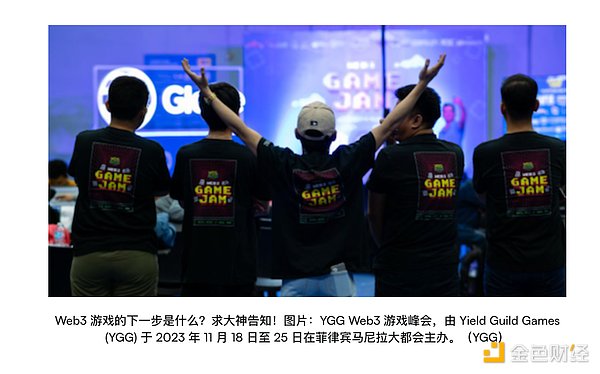
p>
The focus of a guild is to build user reputation?
Dizon initially used YGG funds to reinvest in growing Axies (creating new NFTs) and purchasing other NFTs to invest in other emerging games. Today, he remains focused on the same mission from day one: improving the gaming experience for gamers.
In late 2021, he began building a mission and achievement platform using YGG funding. It allows gamers to earn achievements in different games and build their on-chain reputation. Reputation will be one of the most valuable things in Web3, he told the magazine.
YGG's Guild Advancement Program (GAP) is an event where players can complete in-game and community-based tasks to prove their abilities and their contribution to the wider community.
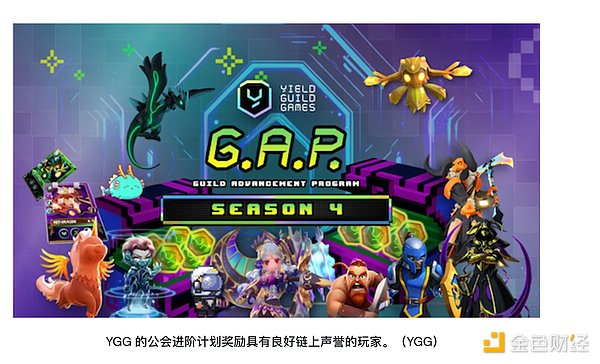
"For example, if a person is able to pass certain tasks, this can be proven on-chain using a non-transferable NFT called a Soulbound Token Or SBT. These are proof of their achievements in web3. The combination of all these SBTs tells a story about an individual. Based on this, the holder can access other games or communities, etc.,” Dizon explained.
The non-transferable nature of SBT is important because it means minted achievement records cannot be purchased or traded and can only be earned through the efforts of the wallet holder.
Another core part of YGG’s mission program is Superquests, launched earlier this year in partnership with Axie Infinity. It allows gamers to develop new skills through learning programs delivered through short-form video content created by top community influencers and YGG esports champions. Although it is for members of the guild community, it is not a closed shop and new members are welcome.
10-15 years from now, I hope people will be able to apply their skills to the virtual economy match. In cryptocurrencies, rewards for effort are a vital currency. ”
Dizon said that the ERC-6551 token standard or token-bound account (TBA) will have an impact on blockchain games, development People are already using it to incorporate artificial intelligence into games.
TBA is a byproduct of the standard that allows NFTs to own other NFTs. So, You may own a TBA, which is also a non-transferable Soulbound Token (SBT).
Dizong said that in the future virtual world, virtual Economies will one day rival smaller countries in terms of GDP. The advent of artificial intelligence will make this possible sooner than you think, and reputation tools will become even more important.
The on-chain reputation of tasks in the virtual world can be checked through wallet history, proof of contribution, and SBT achievements and related metadata. These Web3 tools show how someoneactually what they do and who they are.
"This is very important because I think the next phase of cryptocurrency will be entirely dependent on people's web3 reputation. When it comes to things like liquidity mining, we don’t really differentiate between people who are useful and people who are just there to make money. I think reputation will go a long way in distinguishing who is most useful in the guild and other communities," Dizon noted.
If you are just a wallet address, what have you contributed to the community?"
Strava for games< /strong>
Perion DAO has also used its massive funding to build a gamer reputation tool, among many other things in the bear market. There is a 2-state platform that allows users to trade and redeem NFTs backed by limited sneakers. ZBET, a prototype platform that allows users to place social bets on web3 games, will become its own entity and will be licensed and go live in January.
They have also previously invested some of their funds in game venture capital, meeting with 200 game companies and investing in 15, including equity, tokens and NFT transactions. Starting in 2022, they stopped investing in the game and deployed multiple delta neutral strategies (a hedging strategy) to achieve stable returns on DeFi, more than doubling their runway to around 5 years , 90% of which is now allocated to internal product development.
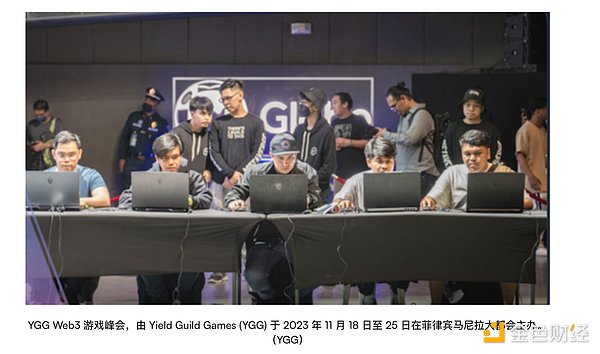
Co-founder Mitch Penman-Allen noted the climate facing the guild when a bear market emerges in 2022.
"This is not the death of the web3 games market. We are convinced that Axie was just an early experiment in applying blockchain to games that failed in the market , the experiment became popular overnight and then died just as quickly... and the 620mm hack didn't help. The hook is there, we already see the potential. We just need to find the long-term use cases."
He said the association still believes gaming will be a huge avenue for consumers to get into cryptocurrencies, but gaming has not yet materialized.
We know that strong teams are developing AAA games using blockchain applications, but building one Great games take time. So we decided to go back to our experience: building high-growth products. We decided to focus on educating often-sceptical Web2 gamers about the value of Web3 applications in gaming. ”
Another problem is mainstream gamers’ suspicion of blockchain games, which they believe are just companies squeezing money from players. Another way.
"Players are finding that playing Axie Infinity costs thousands of dollars. They consider the financialization of game profanity. This comes after years of predatory monetization tactics like microtransactions, subscriptions, and increasing game prices by non-Web3 game studios. ”
So if financialization isn’t the problem, what is? The reward for a job well done. Like YGG, Perion is focused on online reputation building , but for the average gamer, the target is popular games like Fortnite.
They are developing XP, a Strava – Refers to fitness tracking app for bragging to your peers about how fast you run or complete mountain bike trails etc. Early market tests look promising. The Guild’s gaming reputation rankings are XP. gg means players can see how they stack up against their favorite players or friends. Localized leaderboards can bring a new dimension to poker night.
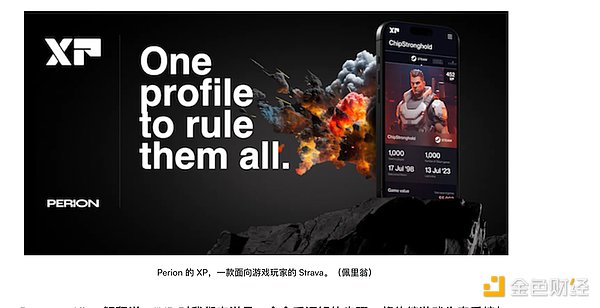
Penman-Allen explains: “XP is a logical step for us. Combining traditional gaming ecosystems with proven rewards, incentives, and competition models to ultimately deliver real benefits to end users. "
Penman-Allen said they don't plan to play the game for money because "we don't want to be relegated to the dark corners of the internet." ”
This product may be a natural evolution of the Play-to-Earn Guild. Previously, specific NFTs were tickets to the game table, like poker buys. But they are expensive, so guilds have emerged to rent NFTs to players. Now, game leaderboards may provide studios with a different mechanism to incentivize gamers.
Gaming guilds and working to make money
Elsewhere, some gaming guilds stick to their Axie guild roots, "building gaming products or for development China has created ways to make money through games or make money through work," said Raman Nambiar, founder of CGU, a gaming guild.
Axie created a community where people could participate and find these jobs, but suddenly there was no way to build an effective workforce."
< /blockquote>In developing countries, especially in Africa, CGUs have shifted from “play to earn money” to “work to earn money”. Another name for money-making work is "job." “Our pivot is to stay true to our original mission of putting people into work in developing countries and using cryptocurrencies to pay people to work,” he said.
CGU also has a user reputation building system in the form of a Talent Management System (TMS). "This evolved from our player management system, which initially tracked player earnings and engagement, to a 'skills mapping' system where we could identify what skills our community had and based on their skills, what they had The curriculum is tailored to provide them with job opportunities to complete tasks as well as tasks they have completed previously,” he said.
CGU pays primarily African internet users for microtasks. Where before this meant playing games, now it means writing posts, following social media, data labeling and data cleaning tasks. They have started teaching ChatGPT as well as social media AI tools. For Nambiar, “it’s in line with the original gaming guild mission.” Maybe not that interesting though. As a result, CGU is now a microtask service provider, often providing services to feed AI models.
At the beginning, there was only one employer Axie. Later Axie was cut off and the task was to find Alternative Employer. All games are crashing because of the crypto market, so we're always trying to find the right employers for these people, but they need to understand artificial intelligence to do these jobs. ”
In Africa, crypto payments make sense. There are millions of people who are unbanked, do not have accounts, or face high-value transactions Fees, internet service can also be hit or miss. So for CGU, “another revenue stream is figuring out mobile money and how to get paid to make large-scale payments in these countries. ”
"In places like Africa or remote islands in Southeast Asia, the Internet is difficult to access or configure. We stumbled upon internet services as a business while trying to provide a way for the workforce to connect with the digital economy. ”
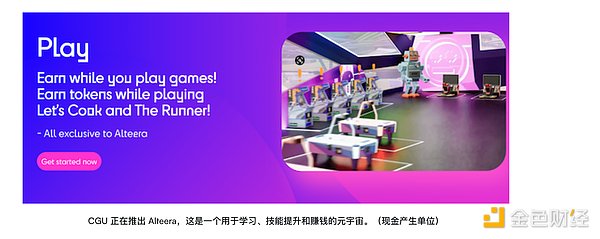 < /p>
< /p>
Nambiar also provides web3 services to web2 companies, such as NFT creation, wallets and Metaverse on mobile phones and laptops.
"By providing essential social media skills, software development and design fundamentals, combined with artificial intelligence tools, we can help workers compete in the digital workforce. ”
A big reason for Axie’s failure was its unsustainable token economy, and various projects are trying to learn from its mistakes.
Balthazar’s strength
Balthazar DAO was established in the form of a guild in 2021 (and passed the proxy raised $5.6 million from coin sales), then tried NFT asset management and markets, and is now designing its own game.

They recently created Wallet Wars, a A game like Space Invaders where you shoot the biggest wallets of cryptocurrencies. It's the idea of a game where gamers can be good guys in a world full of crypto bad guys.
“Through Wallet Wars, our goal is to reignite confidence, unity, and hope in communities facing adversity, creating a point of unity for those who have endured the trials of crypto with unwavering resilience. ” John Stefanidis, co-founder of Balthazar DAO, told the magazine.
To demonstrate our technology, We developed a highly financial web3 arcade style shooter that incorporates multiple winning mechanisms that players can share in a prize pool. It's called "Wallet Wars" as a tribute to those who have experienced setbacks and challenges, These include the dupes, the roughnecks, the hackers, the misfits, the underdogs and the jaded."
Stefanidis said the game was originally It was designed to showcase Web3 technology, but later it developed into a new NFT game financialization model. It struck a chord with the cryptocurrency community, with the first mintage selling out within minutes on October 19 and its first quarter launching in early December.
Wallet Wars offers two tokens. The raw Pass NFT is an ERC-721 NFT on the Ethereum blockchain and includes unique DAO benefits such as reference earnings, governance through factions, and BZR Points (a reward system). The second token is raw Ships on zksync, which is required to play the game. Stefanidis explains the sustainable token economic model as follows:
Players need one of the RAW tokens Codes are required to purchase RAW Ship NFTs, which provide RAW token holders with a commission on every sale made using their code. Most of the earnings go into the bonus pool, which never exceeds actual earnings, thus maintaining sustainability. ”
It’s important to remember that part of token economics is just cold, objective pure mathematics. Zero consideration for human interaction . So, in theory, the original token might be fine. Unless the DAO starts adding utility to the token or repurposing it, which is difficult to do. Or if the operating costs of the business increase. So while the token Coinomics may be mathematically sustainable, but that doesn't mean the business isn't already there.
But if Balthazar DAO can power web3 games Achieve a sustainable token economic model, which may become a harbinger of the web3 game industry.
Web3 games will surpass Axie Is Infinity the height of it?
Guild is a great customer acquisition tool that capitalizes on COVID-19 and unemployment in developing countries Opportunities to create. Their new direction in 2024 gives us insight into where Web3 Gaming and its Scholarship Club will go with clear themes of reputation building.
The guild may still have high hopes for the next bull run, but it's unclear whether a game will emerge that offers the same opportunity and attracts as many players as Axie once did.
There are still many experiments, but YGG's Dizon said: "It's still early for guilds, but we welcome people to build digital communities, which are the precursors of the future digital economy. ”
 JinseFinance
JinseFinance
 JinseFinance
JinseFinance Alex
Alex The Business Times
The Business Times Cointelegraph
Cointelegraph Cointelegraph
Cointelegraph Cointelegraph
Cointelegraph Cointelegraph
Cointelegraph Cointelegraph
Cointelegraph Bitcoinist
Bitcoinist Bitcoinist
Bitcoinist